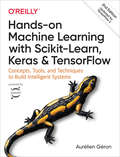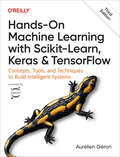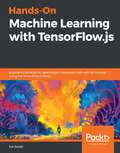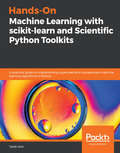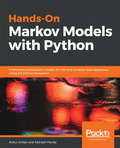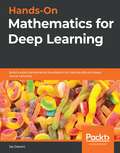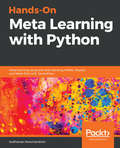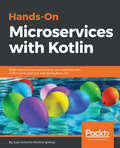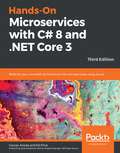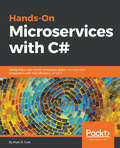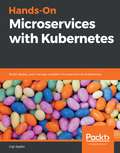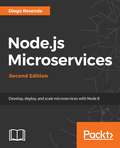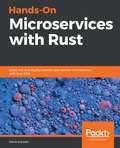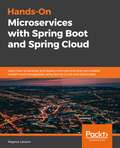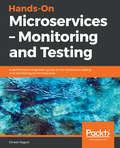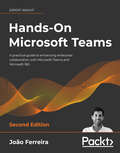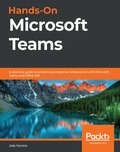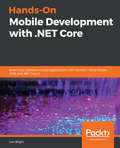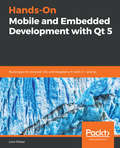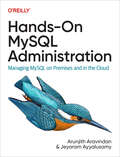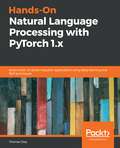- Table View
- List View
Hands-On Machine Learning with Scikit-Learn, Keras, and TensorFlow: Concepts, Tools, and Techniques to Build Intelligent Systems
by Aurélien GéronThrough a series of recent breakthroughs, deep learning has boosted the entire field of machine learning. Now, even programmers who know close to nothing about this technology can use simple, efficient tools to implement programs capable of learning from data. This practical book shows you how.By using concrete examples, minimal theory, and two production-ready Python frameworks—Scikit-Learn and TensorFlow—author Aurélien Géron helps you gain an intuitive understanding of the concepts and tools for building intelligent systems. You’ll learn a range of techniques, starting with simple linear regression and progressing to deep neural networks. With exercises in each chapter to help you apply what you’ve learned, all you need is programming experience to get started.Explore the machine learning landscape, particularly neural netsUse Scikit-Learn to track an example machine-learning project end-to-endExplore several training models, including support vector machines, decision trees, random forests, and ensemble methodsUse the TensorFlow library to build and train neural netsDive into neural net architectures, including convolutional nets, recurrent nets, and deep reinforcement learningLearn techniques for training and scaling deep neural nets
Hands-On Machine Learning with Scikit-Learn, Keras, and TensorFlow: Concepts, Tools, and Techniques to Build Intelligent Systems
by Aurélien GéronThrough a recent series of breakthroughs, deep learning has boosted the entire field of machine learning. Now, even programmers who know close to nothing about this technology can use simple, efficient tools to implement programs capable of learning from data. This bestselling book uses concrete examples, minimal theory, and production-ready Python frameworks (Scikit-Learn, Keras, and TensorFlow) to help you gain an intuitive understanding of the concepts and tools for building intelligent systems.With this updated third edition, author Aurélien Géron explores a range of techniques, starting with simple linear regression and progressing to deep neural networks. Numerous code examples and exercises throughout the book help you apply what you've learned. Programming experience is all you need to get started.Use Scikit-learn to track an example ML project end to endExplore several models, including support vector machines, decision trees, random forests, and ensemble methodsExploit unsupervised learning techniques such as dimensionality reduction, clustering, and anomaly detectionDive into neural net architectures, including convolutional nets, recurrent nets, generative adversarial networks, autoencoders, diffusion models, and transformersUse TensorFlow and Keras to build and train neural nets for computer vision, natural language processing, generative models, and deep reinforcement learning
Hands-On Machine Learning with TensorFlow.js: A guide to building ML applications integrated with web technology using the TensorFlow.js library
by Kai SasakiGet hands-on with the browser-based JavaScript library for training and deploying machine learning models effectively Key Features Build, train and run machine learning models in the browser using TensorFlow.js Create smart web applications from scratch with the help of useful examples Use flexible and intuitive APIs from TensorFlow.js to understand how machine learning algorithms function Book Description TensorFlow.js is a framework that enables you to create performant machine learning (ML) applications that run smoothly in a web browser. With this book, you will learn how to use TensorFlow.js to implement various ML models through an example-based approach. Starting with the basics, you'll understand how ML models can be built on the web. Moving on, you will get to grips with the TensorFlow.js ecosystem to develop applications more efficiently. The book will then guide you through implementing ML techniques and algorithms such as regression, clustering, fast Fourier transform (FFT), and dimensionality reduction. You will later cover the Bellman equation to solve Markov decision process (MDP) problems and understand how it is related to reinforcement learning. Finally, you will explore techniques for deploying ML-based web applications and training models with TensorFlow Core. Throughout this ML book, you'll discover useful tips and tricks that will build on your knowledge. By the end of this book, you will be equipped with the skills you need to create your own web-based ML applications and fine-tune models to achieve high performance. What you will learn Use the t-SNE algorithm in TensorFlow.js to reduce dimensions in an input dataset Deploy tfjs-converter to convert Keras models and load them into TensorFlow.js Apply the Bellman equation to solve MDP problems Use the k-means algorithm in TensorFlow.js to visualize prediction results Create tf.js packages with Parcel, Webpack, and Rollup to deploy web apps Implement tf.js backend frameworks to tune and accelerate app performance Who this book is for This book is for web developers who want to learn how to integrate machine learning techniques with web-based applications from scratch. This book will also appeal to data scientists, machine learning practitioners, and deep learning enthusiasts who are looking to perform accelerated, browser-based machine learning on Web using TensorFlow.js. Working knowledge of JavaScript programming language is all you need to get started.
Hands-On Machine Learning with scikit-learn and Scientific Python Toolkits: A practical guide to implementing supervised and unsupervised machine learning algorithms in Python
by Tarek AmrIntegrate scikit-learn with various tools such as NumPy, pandas, imbalanced-learn, and scikit-surprise and use it to solve real-world machine learning problems Key Features Delve into machine learning with this comprehensive guide to scikit-learn and scientific Python Master the art of data-driven problem-solving with hands-on examples Foster your theoretical and practical knowledge of supervised and unsupervised machine learning algorithms Book Description Machine learning is applied everywhere, from business to research and academia, while scikit-learn is a versatile library that is popular among machine learning practitioners. This book serves as a practical guide for anyone looking to provide hands-on machine learning solutions with scikit-learn and Python toolkits. The book begins with an explanation of machine learning concepts and fundamentals, and strikes a balance between theoretical concepts and their applications. Each chapter covers a different set of algorithms, and shows you how to use them to solve real-life problems. You'll also learn about various key supervised and unsupervised machine learning algorithms using practical examples. Whether it is an instance-based learning algorithm, Bayesian estimation, a deep neural network, a tree-based ensemble, or a recommendation system, you'll gain a thorough understanding of its theory and learn when to apply it. As you advance, you'll learn how to deal with unlabeled data and when to use different clustering and anomaly detection algorithms. By the end of this machine learning book, you'll have learned how to take a data-driven approach to provide end-to-end machine learning solutions. You'll also have discovered how to formulate the problem at hand, prepare required data, and evaluate and deploy models in production. What you will learn Understand when to use supervised, unsupervised, or reinforcement learning algorithms Find out how to collect and prepare your data for machine learning tasks Tackle imbalanced data and optimize your algorithm for a bias or variance tradeoff Apply supervised and unsupervised algorithms to overcome various machine learning challenges Employ best practices for tuning your algorithm's hyper parameters Discover how to use neural networks for classification and regression Build, evaluate, and deploy your machine learning solutions to production Who this book is for This book is for data scientists, machine learning practitioners, and anyone who wants to learn how machine learning algorithms work and to build different machine learning models using the Python ecosystem. The book will help you take your knowledge of machine learning to the next level by grasping its ins and outs and tailoring it to your needs. Working knowledge of Python and a basic understanding of underlying mathematical and statistical concepts is required.
Hands-On Markov Models with Python: Implement probabilistic models for learning complex data sequences using the Python ecosystem
by Ankur Ankan Abinash PandaUnleash the power of unsupervised machine learning in Hidden Markov Models using TensorFlow, pgmpy, and hmmlearnKey FeaturesBuild a variety of Hidden Markov Models (HMM)Create and apply models to any sequence of data to analyze, predict, and extract valuable insightsUse natural language processing (NLP) techniques and 2D-HMM model for image segmentationBook DescriptionHidden Markov Model (HMM) is a statistical model based on the Markov chain concept. Hands-On Markov Models with Python helps you get to grips with HMMs and different inference algorithms by working on real-world problems. The hands-on examples explored in the book help you simplify the process flow in machine learning by using Markov model concepts, thereby making it accessible to everyone.Once you’ve covered the basic concepts of Markov chains, you’ll get insights into Markov processes, models, and types with the help of practical examples. After grasping these fundamentals, you’ll move on to learning about the different algorithms used in inferences and applying them in state and parameter inference. In addition to this, you’ll explore the Bayesian approach of inference and learn how to apply it in HMMs.In further chapters, you’ll discover how to use HMMs in time series analysis and natural language processing (NLP) using Python. You’ll also learn to apply HMM to image processing using 2D-HMM to segment images. Finally, you’ll understand how to apply HMM for reinforcement learning (RL) with the help of Q-Learning, and use this technique for single-stock and multi-stock algorithmic trading.By the end of this book, you will have grasped how to build your own Markov and hidden Markov models on complex datasets in order to apply them to projects.What you will learnExplore a balance of both theoretical and practical aspects of HMMImplement HMMs using different datasets in Python using different packagesUnderstand multiple inference algorithms and how to select the right algorithm to resolve your problemsDevelop a Bayesian approach to inference in HMMsImplement HMMs in finance, natural language processing (NLP), and image processingDetermine the most likely sequence of hidden states in an HMM using the Viterbi algorithmWho this book is forHands-On Markov Models with Python is for you if you are a data analyst, data scientist, or machine learning developer and want to enhance your machine learning knowledge and skills. This book will also help you build your own hidden Markov models by applying them to any sequence of data.Basic knowledge of machine learning and the Python programming language is expected to get the most out of the book
Hands-On Mathematics for Deep Learning: Build A Solid Mathematical Foundation For Training Efficient Deep Neural Networks
by Jay DawaniThis book is for data scientists, machine learning developers, aspiring deep learning developers or anyone who wants to understand the foundation of deep learning by learning the math behind it. Working knowledge of the Python programming language and machine learning basics is required.
Hands-On Meta Learning with Python
by Sudharsan RavichandiranThe book will help machine learning enthusiasts, AI researchers, and data scientists who want to learn meta learning as an advanced approach for training the machine learning models. The book assumes a working knowledge of Machine learning concepts and sound knowledge of Python programming
Hands-On Microservices with Kotlin: Build reactive and cloud-native microservices with Kotlin using Spring 5 and Spring Boot 2.0
by Juan Antonio Medina IglesiasBuild smart, efficient, and fast enterprise-grade web implementation of the microservices architecture that can be easily scaled. Key Features Write easy-to-maintain lean and clean code with Kotlin for developing better microservices Scale your Microserivces in your own cloud with Docker and Docker Swarm Explore Spring 5 functional reactive web programming with Spring WebFlux Book Description With Google's inclusion of first-class support for Kotlin in their Android ecosystem, Kotlin's future as a mainstream language is assured. Microservices help design scalable, easy-to-maintain web applications; Kotlin allows us to take advantage of modern idioms to simplify our development and create high-quality services. With 100% interoperability with the JVM, Kotlin makes working with existing Java code easier. Well-known Java systems such as Spring, Jackson, and Reactor have included Kotlin modules to exploit its language features. This book guides the reader in designing and implementing services, and producing production-ready, testable, lean code that's shorter and simpler than a traditional Java implementation. Reap the benefits of using the reactive paradigm and take advantage of non-blocking techniques to take your services to the next level in terms of industry standards. You will consume NoSQL databases reactively to allow you to create high-throughput microservices. Create cloud-native microservices that can run on a wide range of cloud providers, and monitor them. You will create Docker containers for your microservices and scale them. Finally, you will deploy your microservices in OpenShift Online. What you will learn Understand microservice architectures and principles Build microservices in Kotlin using Spring Boot 2.0 and Spring Framework 5.0 Create reactive microservices that perform non-blocking operations with Spring WebFlux Use Spring Data to get data reactively from MongoDB Test effectively with JUnit and Kotlin Create cloud-native microservices with Spring Cloud Build and publish Docker images of your microservices Scaling microservices with Docker Swarm Monitor microservices with JMX Deploy microservices in OpenShift Online Who this book is for If you are a Kotlin developer with a basic knowledge of microservice architectures and now want to effectively implement these services on enterprise-level web applications, then this book is for you
Hands-On Microservices with C# 8 and .NET Core 3: Refactor you monolith architecture into microservices using Azure, 3rd Edition
by Scott Hanselman Ed Price Gaurav AroraaLearn the essential concepts, techniques, and design patterns that will help you build scalable and maintainable distributed systems Key Features Learn to design, implement, test, and deploy your microservices Understand the challenges and complexities of testing and monitoring distributed services Build modular and robust microservice architectures with the latest features of C# 8 and .NET Core 3.1 Book Description The microservice architectural style promotes the development of complex applications as a suite of small services based on specific business capabilities. With this book, you'll take a hands-on approach to build microservices and deploy them using ASP .NET Core and Microsoft Azure. You'll start by understanding the concept of microservices and their fundamental characteristics. This microservices book will then introduce a real-world app built as a monolith, currently struggling under increased demand and complexity, and guide you in its transition to microservices using the latest features of C# 8 and .NET Core 3. You'll identify service boundaries, split the application into multiple microservices, and define service contracts. You'll also explore how to configure, deploy, and monitor microservices using Docker and Kubernetes, and implement autoscaling in a microservices architecture for enhanced productivity. Once you've got to grips with reactive microservices, you'll discover how keeping your code base simple enables you to focus on what's important rather than on messy asynchronous calls. Finally, you'll delve into various design patterns and best practices for creating enterprise-ready microservice applications. By the end of this book, you'll be able to deconstruct a monolith successfully to create well-defined microservices. What you will learn Package, deploy, and manage microservices and containers with Azure Service Fabric Use REST APIs to integrate services using a synchronous approach Protect public APIs using Azure Active Directory and OAuth 2.0 Understand the operation and scaling of microservices using Docker and Kubernetes Implement reactive microservices with Reactive Extensions Discover design patterns and best practices for building enterprise-ready apps Who this book is for This book is for C# and .NET Core developers who want to understand microservices architecture and implement it in their .NET Core applications. If you're new to building microservices or have theoretical knowledge of the architectural approach, this book will help you gain a practical perspective to manage application complexity efficiently.
Hands-On Microservices with C#: Designing a real-worl, enterprise-grade microservice ecosystem with the efficiency of C# 7
by Matt R. ColeBuild enterprise-grade microservice ecosystems with intensive case studies using C#Key FeaturesLearn to build message-based microservicesPacked with case studies to explain the intricacies of large-scale microservicesBuild scalable, modular, and robust architectures with C#Book DescriptionC# is a powerful language when it comes to building applications and software architecture using rich libraries and tools such as .NET.This book will harness the strength of C# in developing microservices architectures and applications.This book shows developers how to develop an enterprise-grade, event-driven, asynchronous, message-based microservice framework using C#, .NET, and various open source tools. We will discuss how to send and receive messages, how to design many types of microservice that are truly usable in a corporate environment. We will also dissect each case and explain the code, best practices, pros and cons, and more.Through our journey, we will use many open source tools, and create file monitors, a machine learning microservice, a quantitative financial microservice that can handle bonds and credit default swaps, a deployment microservice to show you how to better manage your deployments, and memory, health status, and other microservices. By the end of this book, you will have a complete microservice ecosystem you can place into production or customize in no time.What you will learnExplore different open source tools within the context of designing microservicesLearn to provide insulation to exception-prone function callsBuild common messages used between microservices for communicationLearn to create a microservice using our base class and interfaceDesign a quantitative financial machine microserviceLearn to design a microservice that is capable of using Blockchain technology Who this book is forC# developers, software architects, and professionals who want to master the art of designing the microservice architecture that is scalable based on environment. Developers should have a basic understanding of.NET application development using C# and Visual Studio
Hands-On Microservices with Kubernetes: Build, deploy, and manage scalable microservices on Kubernetes
by Gigi SayfanEnhance your skills in building scalable infrastructure for your cloud-based applications Key Features Learn to design a scalable architecture by building continuous integration (CI) pipelines with Kubernetes Get an in-depth understanding of role-based access control (RBAC), continuous deployment (CD), and observability Monitor a Kubernetes cluster with Prometheus and Grafana Book Description Kubernetes is among the most popular open-source platforms for automating the deployment, scaling, and operations of application containers across clusters of hosts, providing a container-centric infrastructure. Hands-On Microservices with Kubernetes starts by providing you with in-depth insights into the synergy between Kubernetes and microservices. You will learn how to use Delinkcious, which will serve as a live lab throughout the book to help you understand microservices and Kubernetes concepts in the context of a real-world application. Next, you will get up to speed with setting up a CI/CD pipeline and configuring microservices using Kubernetes ConfigMaps. As you cover later chapters, you will gain hands-on experience in securing microservices, and implementing REST, gRPC APIs, and a Delinkcious data store. In addition to this, you'll explore the Nuclio project, run a serverless task on Kubernetes, and manage and implement data-intensive tests. Toward the concluding chapters, you'll deploy microservices on Kubernetes and learn to maintain a well-monitored system. Finally, you'll discover the importance of service meshes and how to incorporate Istio into the Delinkcious cluster. By the end of this book, you'll have gained the skills you need to implement microservices on Kubernetes with the help of effective tools and best practices. What you will learn Understand the synergy between Kubernetes and microservices Create a complete CI/CD pipeline for your microservices on Kubernetes Develop microservices on Kubernetes with the Go kit framework using best practices Manage and monitor your system using Kubernetes and open-source tools Expose your services through REST and gRPC APIs Implement and deploy serverless functions as a service Externalize authentication, authorization and traffic shaping using a service mesh Run a Kubernetes cluster in the cloud on Google Kubernetes Engine Who this book is for This book is for developers, DevOps engineers, or anyone who wants to develop large-scale microservice-based systems on top of Kubernetes. If you are looking to use Kubernetes on live production projects or want to migrate existing systems to a modern containerized microservices system, then this book is for you. Coding skills, together with some knowledge of Docker, Kubernetes, and cloud concepts will be useful.
Hands-On Microservices with Node.js: Build, test, and deploy robust microservices in JavaScript
by Diogo ResendeLearn essential microservices concepts while developing scalable applications with Express, Docker, Kubernetes, and Docker Swarm using Node 10Key FeaturesWrite clean and maintainable code with JavaScript for better microservices developmentDive into the Node.js ecosystem and build scalable microservices with Seneca, Hydra, and Express.jsDevelop smart, efficient, and fast enterprise-grade microservices implementationBook DescriptionMicroservices enable us to develop software in small pieces that work together but can be developed separately; this is one reason why enterprises have started embracing them. For the past few years, Node.js has emerged as a strong candidate for developing microservices because of its ability to increase your productivity and the performance of your applications.Hands-On Microservices with Node.js is an end-to-end guide on how to dismantle your monolithic application and embrace the microservice architecture - right from architecting your services and modeling them to integrating them into your application. We'll develop and deploy these microservices using Docker. Scalability is an important factor to consider when adding more functionality to your application, and so we delve into various solutions, such as Docker Swarm and Kubernetes, to scale our microservices. Testing and deploying these services while scaling is a real challenge; we'll overcome this challenge by setting up deployment pipelines that break up application build processes in several stages. Later on, we'll take a look at serverless architecture for our microservices and its benefits against traditional architecture. Finally, we share best practices and several design patterns for creating efficient microservices.What you will learnLearn microservice conceptsExplore different service architectures, such as Hydra and SenecaUnderstand how to use containers and the process of testingUse Docker and Swarm for continuous deployment and scalingLearn how to geographically spread your microservicesDeploy a cloud-native microservice to an online providerKeep your microservice independent of online providersWho this book is forThis book is for JavaScript developers seeking to utilize their skills to build microservices and move away from the monolithic architecture. Prior knowledge of Node.js is assumed.
Hands-On Microservices with Rust 2018: Build, Test, And Deploy Scalable And Reactive Microservices With Rust 2018
by Denis KolodinThis book is for developers who have basic knowledge of RUST, and want to learn how to build, test, scale, and manage RUST microservices. No prior experience of writing microservices in RUST is assumed.
Hands-On Microservices with Spring Boot and Spring Cloud: Build and deploy Java microservices using Spring Cloud, Istio, and Kubernetes
by Magnus LarssonApply microservices patterns to build resilient and scalable distributed systems Key Features Understand the challenges of building large-scale microservice landscapes Build cloud-native production-ready microservices with this comprehensive guide Discover how to get the best out of Spring Cloud, Kubernetes, and Istio when used together Book Description Microservices architecture allows developers to build and maintain applications with ease, and enterprises are rapidly adopting it to build software using Spring Boot as their default framework. With this book, you'll learn how to efficiently build and deploy microservices using Spring Boot. This microservices book will take you through tried and tested approaches to building distributed systems and implementing microservices architecture in your organization. Starting with a set of simple cooperating microservices developed using Spring Boot, you'll learn how you can add functionalities such as persistence, make your microservices reactive, and describe their APIs using Swagger/OpenAPI. As you advance, you'll understand how to add different services from Spring Cloud to your microservice system. The book also demonstrates how to deploy your microservices using Kubernetes and manage them with Istio for improved security and traffic management. Finally, you'll explore centralized log management using the EFK stack and monitor microservices using Prometheus and Grafana. By the end of this book, you'll be able to build microservices that are scalable and robust using Spring Boot and Spring Cloud. What you will learn Build reactive microservices using Spring Boot Develop resilient and scalable microservices using Spring Cloud Use OAuth 2.0/OIDC and Spring Security to protect public APIs Implement Docker to bridge the gap between development, testing, and production Deploy and manage microservices using Kubernetes Apply Istio for improved security, observability, and traffic management Who this book is for This book is for Java and Spring developers and architects who want to learn how to break up their existing monoliths into microservices and deploy them either on-premises or in the cloud using Kubernetes as a container orchestrator and Istio as a service Mesh. No familiarity with microservices architecture is required to get started with this book.
Hands-On Microservices – Monitoring and Testing: A performance engineer's guide to the continuous testing and monitoring of microservices
by Dinesh RajputLearn and implement various techniques related to testing, monitoring and optimization for microservices architecture. Key Features *Learn different approaches for testing microservices to design and implement, robust and secure applications *Become more efficient while working with microservices *Explore Testing and Monitoring tools such as JMeter, Ready API,and AppDynamics Book Description Microservices are the latest "right" way of developing web applications. Microservices architecture has been gaining momentum over the past few years, but once you've started down the microservices path, you need to test and optimize the services. This book focuses on exploring various testing, monitoring, and optimization techniques for microservices. The book starts with the evolution of software architecture style, from monolithic to virtualized, to microservices architecture. Then you will explore methods to deploy microservices and various implementation patterns. With the help of a real-world example, you will understand how external APIs help product developers to focus on core competencies. After that, you will learn testing techniques, such as Unit Testing, Integration Testing, Functional Testing, and Load Testing. Next, you will explore performance testing tools, such as JMeter, and Gatling. Then, we deep dive into monitoring techniques and learn performance benchmarking of the various architectural components. For this, you will explore monitoring tools such as Appdynamics, Dynatrace, AWS CloudWatch, and Nagios. Finally, you will learn to identify, address, and report various performance issues related to microservices. What you will learn *Understand the architecture of microservices and how to build services *Establish how external APIs help to accelerate the development process *Understand testing techniques, such as unit testing, integration testing, end-to-end testing, and UI/functional testing *Explore various tools related to the performance testing, monitoring, and optimization of microservices *Design strategies for performance testing *Identify performance issues and fine-tune performance Who this book is for This book is for developers who are involved with microservices architecture to develop robust and secure applications. Basic knowledge of microservices is essential in order to get the most out of this book.
Hands-On Microsoft Lists: Create custom data models and improve the way data is organized using Lists in Microsoft 365
by Joao Ferreira Rene ModeryPrepare to be a Microsoft Lists advocate and transform the way data is harnessed in your organizationKey FeaturesGet to grips with Microsoft Lists and organize your data efficientlyDiscover best practices and real-world scenarios to track information, events, and issues in your organizationTake control of your data by creating custom data models using Microsoft ListsBook DescriptionMicrosoft Lists is an extremely flexible and powerful platform for creating custom data models. Hands-On Microsoft Lists is an easy-to-read guide for those who want to get started with Lists, as well as those who are already familiar with the basic concepts and want to create custom and flexible Lists that are easily available through a web interface. This comprehensive introduction to Lists will show you how to get up to speed in no time with the help of practical guidance and examples. Complete with hands-on tutorials and projects, you'll understand how to use and implement Microsoft Lists effectively. You'll start by covering all the basic concepts that will help you to build your Microsoft Lists and get the most out of the platform. As you progress, you'll explore how to customize Microsoft Lists layouts and forms. Later chapters will guide you through integrating Microsoft Lists with the Power Platform. Throughout the book, you'll work with practical scenarios that you can use daily to improve the collaboration in your organization. By the end of this Microsoft book, you'll have learned how to create custom data models to improve the way your data is put together, managed, and consumed in your workplace.What you will learnUse the Lists platform effectively in the modern workplaceGet to grips with data privacyDiscover how to customize Microsoft Lists data and formsAutomate processes using Microsoft ListsExtend the default features of Microsoft Lists using the SharePoint frameworkCreate custom list templates using PnP PowerShellExtend Microsoft Lists using Power PlatformWho this book is forThis book is for business professionals and end users working with Microsoft 365 tools such as Microsoft SharePoint and Microsoft Teams who are looking to improve the way their data is structured, managed, and consumed inside an organization. Basic knowledge of SharePoint and Excel is assumed.
Hands-On Microsoft Teams: A practical guide to enhancing enterprise collaboration with Microsoft Teams and Microsoft 365, 2nd Edition
by Joao FerreiraHarness the power of Teams to improve enterprise productivity and engagementKey FeaturesUpdated with new chapters on Teams templates, the special editions of Teams, and Microsoft VivaCustomize Teams for increased efficiency, collaborate with best practices, and use advanced Teams functionalities to your advantageExtend Teams through integration with Microsoft services such as PowerShell, SharePoint, Power Apps, and Power AutomateBook DescriptionMicrosoft Teams is your entry point to communication and collaboration in the modern workplace. In Hands-On Microsoft Teams, experienced Microsoft 365 certified professional Joao Ferreira shows you how to use Microsoft Teams to its full potential through practical tutorials.This guide to mastering Teams explores the platform in comprehensive detail and how it interacts with the rest of the Microsoft ecosystem to help you work efficiently and manage your resources. You'll get to grips with core functionality like setting up and managing teams, channels, chats, tabs, and meetings. You'll also learn to get the best out of Teams by adding custom apps, integrating with Microsoft 365, using PowerShell automation, and exploring useful settings you didn't know existed. Along the way, you'll be shown various real-world scenarios and how to implement solutions for them in Teams that will increase your productivity.Whether you're an administrator, manager, or team member, by the end of this book you'll be confident in using everything Microsoft Teams has to offer.What you will learnPerform scheduling and manage meetings, live events, and webinarsCreate and manage Microsoft Teams templates to streamline company processesDeal with permissions and security issues in managing private and public teams and channelsExtend Microsoft Teams using custom apps, Microsoft 365, and PowerShell automationBuild your own Teams app with The Developer Portal without writing any codeDeploy helpful chatbots using QnA Maker and Power Virtual AgentsExplore Teams use cases for education, frontline work, and personal lifeBring together knowledge, learning, resources, and insights with the new employee experience platform, Microsoft VivaWho this book is forThis Microsoft Teams book is for business professionals looking to use Teams for improving collaboration in an enterprise environment. The book will also be useful for Microsoft 365 administrators interested in implementing Microsoft Teams effectively.
Hands-On Microsoft Teams: A practical guide to enhancing enterprise collaboration with Microsoft Teams and Office 365
by Joao Ferreira(A new edition with enhanced coverage is now available) A complete guide on Teams filled with real-world scenarios and best practices to increase productivity and engagementKey FeaturesInteractive approach to learn the key concepts of Teams and its implementation in modern workplaceDiscover tips and techniques for extending Teams to meet your business requirementsIntegrate Teams with various Microsoft services such as PowerShell, SharePoint, PowerApps, and Power AutomateBook DescriptionMicrosoft Teams is a platform for unified communication in modern workplaces. It not only enables effective communication, but also helps you manage your resources through its integration with various Microsoft Office 365 services. This book offers a comprehensive introduction to the platform, getting you up to speed in no time. Complete with hands-on tutorials, and projects, this easy-to-follow guide will teach you how to use Teams in the best possible way. Starting with the basic concepts that will help you collaborate on Teams, this book takes you through expert techniques for creating and managing teams. A dedicated section also features industry practices to help enhance collaboration in modern workplaces. In later chapters, you'll explore Microsoft services such as SharePoint, PowerApps, Power Automate, and learn how they interact with Microsoft Teams. You'll also get to grips with dealing with permissions and security issues in managing private and public teams and channels. Along the way, you'll discover practical scenarios that will help you improve the collaboration in your organization and increase productivity by using Teams features. By the end of this book, you'll have hands-on experience of using Microsoft Teams, along with the skills you need to improve the way people collaborate in your organization.What you will learnCreate teams, channels, and tabs in Microsoft TeamsExplore the Teams architecture and various Office 365 components included in TeamsPerform scheduling, and managing meetings and live events in TeamsConfigure and manage apps in TeamsDesign automated scripts for managing a Teams environment using PowerShellBuild your own Microsoft Teams app without writing codeWho this book is forThis Microsoft Teams book is for power users and business professionals looking to use Teams for improving collaboration in an enterprise environment. The book will also be useful for Office 365 administrators interested in implementing Microsoft Teams effectively by learning about and exploring expert tips and best practices to ensure good governance.
Hands-On Microsoft® Windows® Server 2016
by Michael PalmerDiscover the perfect resource for learning Windows Server 2016 from the ground up with HANDS-ON MICROSOFT WINDOWS SERVER 2016. Designed to build a foundation in basic server administration, this book requires no previous server experience. It covers all of the critical Windows Server 2016 features, including the advantages unique to this new server operating system. You learn how to choose the right server edition for your needs. You also learn to install, configure, customize, manage, and troubleshoot your server most effectively. If you are new to server administration, this book gives you the background and knowledge you need to manage servers on small to large networks. If you are an experienced server administrator, this book provides a fast way to get up to speed on the latest Windows Server 2016 administration.
Hands-On Mobile Development with .NET Core: Build cross-platform mobile applications with Xamarin, Visual Studio 2019, and .NET Core 3
by Can BilginDevelop native applications for multiple mobile and desktop platforms including but not limited to iOS, Android, and UWP with the Xamarin framework and Xamarin.FormsKey FeaturesUnderstand .NET Core and its cross-platform development philosophy Build Android, iOS, and Windows mobile applications with C#, .NET Core, and Azure Cloud ServicesBring Artificial Intelligence capabilities into your mobile applications with Azure AIBook Description.NET Core is the general umbrella term used for Microsoft’s cross-platform toolset. Xamarin used for developing mobile applications, is one of the app model implementations for .NET Core infrastructure. In this book, you will learn how to design, architect, and develop highly attractive, maintainable, efficient, and robust mobile applications for multiple platforms, including iOS, Android, and UWP, with the toolset provided by Microsoft using Xamarin, .NET Core, and Azure Cloud Services. This book will take you through various phases of application development with Xamarin, from environment setup, design, and architecture to publishing, using real-world scenarios. Throughout the book, you will learn how to develop mobile apps using Xamarin, Xamarin.Forms and .NET Standard; implement a webbased backend composed of microservices with .NET Core using various Azure services including but not limited to Azure App Services, Azure Active Directory, Notification Hub, Logic Apps, and Azure Functions, Cognitive Services; create data stores using popular database technologies such as Cosmos DB, SQL and Realm.Towards the end, the book will help developers to set up an efficient and maintainable development pipeline to manage the application life cycle using Visual Studio App Center and Visual Studio Services.What you will learnImplement native applications for multiple mobile and desktop platformsUnderstand and use various Azure Services with .NET CoreMake use of architectural patterns designed for mobile and web applicationsUnderstand the basic Cosmos DB conceptsUnderstand how different app models can be used to create an app serviceExplore the Xamarin and Xamarin.Forms UI suite with .NET Core for building mobile applicationsWho this book is forThis book is for mobile developers who wish to develop cross-platform mobile applications. Programming experience with C# is required. Some knowledge and understanding of core elements and cross-platform application development with .NET is required.
Hands-On Mobile and Embedded Development with Qt 5: Build apps for Android, iOS, and Raspberry Pi with C++ and Qt
by Lorn PotterExplore Qt framework and APIs for building cross-platform applications for mobile devices, embedded systems, and IoTKey FeaturesBuild cross-platform applications and deploy them across mobile and connected devicesDesign 2D and 3D UIs for embedded systems using Yocto and Qt CreatorBuild machine to machine automation solution using QtSensors, QtMQTT, and QtWebSocketsBook DescriptionQt is a world-class framework, helping you to develop rich graphical user interfaces (GUIs) and multi-platform applications that run on all major desktop platforms and most mobile or embedded platforms. The framework helps you connect the dots across platforms and between online and physical experience.This book will help you leverage the fully-featured Qt framework and its modular cross-platform library classes and intuitive APIs to develop applications for mobile, IoT, and industrial embedded systems. Considerations such as screen size, device orientation changes, and small memory will be discussed. We will focus on various core aspects of embedded and mobile systems, such as connectivity, networking, and sensors; there is no IoT without sensors. You will learn how to quickly design a flexible, fast, and responsive UI that looks great. Going further, you will implement different elements in a matter of minutes and synchronize the UI elements with the 3D assets with high precision. You will learn how to create high-performance embedded systems with 3D/2D user interfaces, and deploy and test on your target hardware. The book will explore several new features, including Qt for WebAssembly.At the end of this book, you will learn about creating a full software stack for embedded Linux systems using Yocto and Boot to Qt for Device Creation.What you will learnExplore the latest features of Qt, such as preview for Qt for Python and Qt for WebAssemblyCreate fluid UIs with a dynamic layout for different sized screensDeploy embedded applications on Linux systems using YoctoDesign Qt APIs for building applications for embedded and mobile devicesUtilize connectivity for networked and machine automated applicationsDiscover effective techniques to apply graphical effects using Qt Quick appsWho this book is forThe book is ideal for mobile developers, embedded systems engineers and enthusiasts who are interested in building cross-platform applications with Qt. Prior knowledge of C++ is required.
Hands-On Motion Graphics with Adobe After Effects CC: Develop your skills as a visual effects and motion graphics artist
by David DoddsDiscover techniques to enhance your videos with complex animationKey FeaturesDesign, animate, and sequence a complete motion graphics projectWork with compositions and pre-compositions to create animations speedilyMaximize your motion graphics and visual effects skillsBook DescriptionIf you’re thinking seriously about making and publishing your videos with professional editing and animation, look no further! Adobe After Effects is a popular tool among video editors and YouTubers to enhance their videos and bring them to life by implementing visual effects and motion graphics.This book will take you right from the basics through to the advanced techniques in Adobe After Effects CC 2018. You will start by setting up your editing environment to learn and improve techniques to sharpen your video editing skills. Furthermore, you will work with basic and advanced special effects to create, modify, and optimize motion graphics in your videos. Lastly, you will not only learn how to create 2.5D animations, but also get to grips with using Cinema 4D Lite to build and animate complete 3D scenes.By the end of the book, you’ll have learned how to package a video efficiently with the help of the projects covered.What you will learnCreate a lower third project for a TV show with complex layersWork with shape layer animation to create an animated lyrics videoExplore different tools to animate charactersApply text animation to create a dynamic film-opening titleUse professional visual effects to create a VFX projectModel, light, and composite your 3D project in After EffectsWho this book is forIf you’re a student, professional, YouTuber, or anyone who is interested in video editing, animation, and motion graphics, this book is for you. You’ll also find this resource useful if you’re an Illustrator looking to put your creations in motion.
Hands-On Music Generation with Magenta: Explore the role of deep learning in music generation and assisted music composition
by Alexandre DuBreuilDesign and use machine learning models for music generation using Magenta and make them interact with existing music creation tools Key Features Learn how machine learning, deep learning, and reinforcement learning are used in music generation Generate new content by manipulating the source data using Magenta utilities, and train machine learning models with it Explore various Magenta projects such as Magenta Studio, MusicVAE, and NSynth Book Description The importance of machine learning (ML) in art is growing at a rapid pace due to recent advancements in the field, and Magenta is at the forefront of this innovation. With this book, you'll follow a hands-on approach to using ML models for music generation, learning how to integrate them into an existing music production workflow. Complete with practical examples and explanations of the theoretical background required to understand the underlying technologies, this book is the perfect starting point to begin exploring music generation. The book will help you learn how to use the models in Magenta for generating percussion sequences, monophonic and polyphonic melodies in MIDI, and instrument sounds in raw audio. Through practical examples and in-depth explanations, you'll understand ML models such as RNNs, VAEs, and GANs. Using this knowledge, you'll create and train your own models for advanced music generation use cases, along with preparing new datasets. Finally, you'll get to grips with integrating Magenta with other technologies, such as digital audio workstations (DAWs), and using Magenta.js to distribute music generation apps in the browser. By the end of this book, you'll be well-versed with Magenta and have developed the skills you need to use ML models for music generation in your own style. What you will learn Use RNN models in Magenta to generate MIDI percussion, and monophonic and polyphonic sequences Use WaveNet and GAN models to generate instrument notes in the form of raw audio Employ Variational Autoencoder models like MusicVAE and GrooVAE to sample, interpolate, and humanize existing sequences Prepare and create your dataset on specific styles and instruments Train your network on your personal datasets and fix problems when training networks Apply MIDI to synchronize Magenta with existing music production tools like DAWs Who this book is for This book is for technically inclined artists and musically inclined computer scientists. Readers who want to get hands-on with building generative music applications that use deep learning will also find this book useful. Although prior musical or technical competence is not required, basic knowledge of the Python programming language is assumed.
Hands-On MySQL Administration: Managing MySQL on Premises and in the Cloud
by Arunjith Aravindan Jeyaram AyyalusamyGeared to intermediate- to advanced-level DBAs and IT professionals looking to enhance their MySQL skills, this guide provides a comprehensive overview on how to manage and optimize MySQL databases. You'll learn how to create databases and implement backup and recovery, security configurations, high availability, scaling techniques, and performance tuning. Using practical techniques, tips, and real-world examples, authors Arunjith Aravindan and Jeyaram Ayyalusamy show you how to deploy and manage MySQL, Amazon RDS, Amazon Aurora, and Azure MySQL. By the end of the book, you'll have the knowledge and skills necessary to administer, manage, and optimize MySQL databases effectively. Design and implement a scalable and reliable database infrastructure using MySQL 8 on premises and cloudInstall and configure software, manage user accounts, and optimize database performanceUse backup and recovery strategies, security measures, and high availability solutionsApply best practices for database schema design, indexing strategies, and replication techniquesImplement advanced database features and techniques such as replication, clustering, load balancing, and high availabilityTroubleshoot common issues and errors, using diagnostic tools and techniques to identify and resolve problems quickly and efficientlyFacilitate major MySQL upgrades including MySQL 5.7 to MySQL 8
Hands-On Natural Language Processing with PyTorch 1.x: Build smart, AI-driven linguistic applications using deep learning and NLP techniques
by Thomas DopBecome a proficient NLP data scientist by developing deep learning models for NLP and extract valuable insights from structured and unstructured data Key Features Get to grips with word embeddings, semantics, labeling, and high-level word representations using practical examples Learn modern approaches to NLP and explore state-of-the-art NLP models using PyTorch Improve your NLP applications with innovative neural networks such as RNNs, LSTMs, and CNNs Book Description In the internet age, where an increasing volume of text data is generated daily from social media and other platforms, being able to make sense of that data is a crucial skill. With this book, you'll learn how to extract valuable insights from text by building deep learning models for natural language processing (NLP) tasks. Starting by understanding how to install PyTorch and using CUDA to accelerate the processing speed, you'll explore how the NLP architecture works with the help of practical examples. This PyTorch NLP book will guide you through core concepts such as word embeddings, CBOW, and tokenization in PyTorch. You'll then learn techniques for processing textual data and see how deep learning can be used for NLP tasks. The book demonstrates how to implement deep learning and neural network architectures to build models that will allow you to classify and translate text and perform sentiment analysis. Finally, you'll learn how to build advanced NLP models, such as conversational chatbots. By the end of this book, you'll not only have understood the different NLP problems that can be solved using deep learning with PyTorch, but also be able to build models to solve them. What you will learn Use NLP techniques for understanding, processing, and generating text Understand PyTorch, its applications and how it can be used to build deep linguistic models Explore the wide variety of deep learning architectures for NLP Develop the skills you need to process and represent both structured and unstructured NLP data Become well-versed with state-of-the-art technologies and exciting new developments in the NLP domain Create chatbots using attention-based neural networks Who this book is for This PyTorch book is for NLP developers, machine learning and deep learning developers, and anyone interested in building intelligent language applications using both traditional NLP approaches and deep learning architectures. If you're looking to adopt modern NLP techniques and models for your development projects, this book is for you. Working knowledge of Python programming, along with basic working knowledge of NLP tasks, is required.
